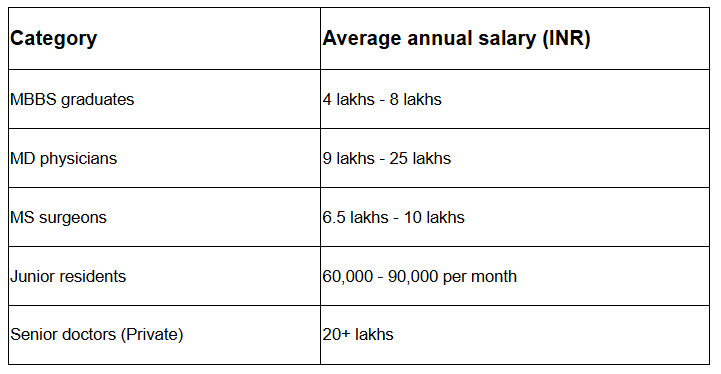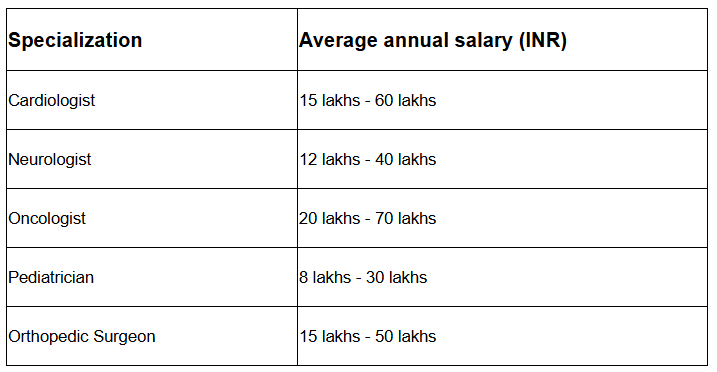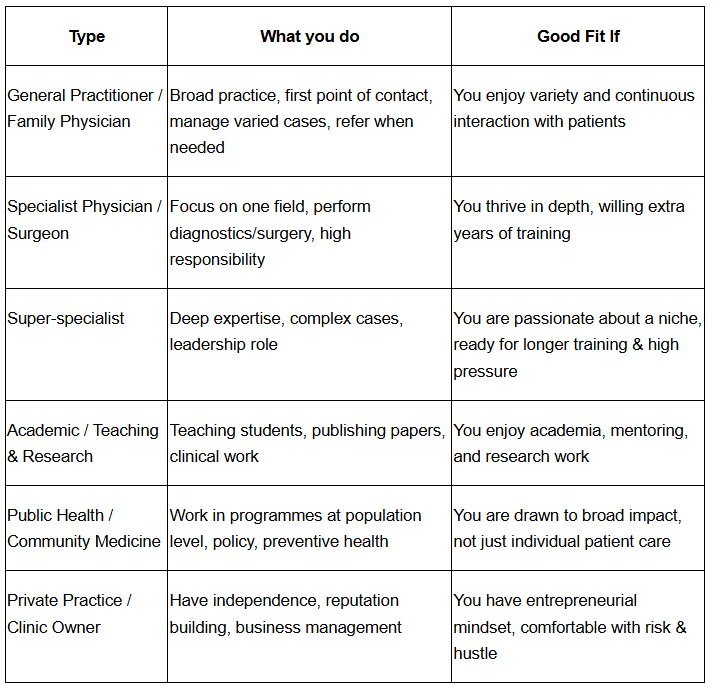November 15, 2025
Doctor Career: Scope, Salary, and Future Opportunities in India
The medical profession in India is highly prestigious and well paid. Doctors are an important part of the healthcare system, and their salaries are determined by their expertise and hard work. The salary of an Indian doctor career depends on some factors like specialization, location, experience and type of organization. Being a doctor in India is a commitment to healing and service. But for those pursuing this as a career choice, one should also be aware of the changing landscape of a doctor’s salary in India. This article explores the financial aspects of a medical profession in India, an overview of the average salary of a doctor in India, the factors that affects the salaries of a doctor, and the career prospects of a doctor in India.
Is Doctor a Good Career?
When you have decided to choose a career in medicine, you might be asking yourself ”Is doctor a good career?” Let’s discuss it.
Deciding to pursue a doctor career means accepting a role that blends science with humanity. This is what makes it a good career—and what you must remember:
Why it's good:
- Profession with social respect: Becoming a doctor carries responsibility.
- Increasing demand:With India’s rapidly increasing population, health-care awareness and expanding infrastructure, the requirement of doctors continues to rise.
- Diversity of roles: From general practice to super-specialty, you have a lot of options.
- Emotional satisfaction: You are making a difference in the lives of people.
Considerations:
- Time-investment: The journey is long- from MBBS to (often) postgraduate specialisation.
- Work-load and stress: Nights, emergencies, coping with patient lives.
- Achieving financial stability takes time: The first few years may not be as profitable as some anticipate-salary increases with experience and specialisation. For example, MBBS graduate doctors may make a few lakhs per year, while specialists with several years of experience earn much more.
- Lifelong learning: You have to keep learning and acquiring knowledge and skills throughout your career.
If you feel motivated by helping others, ready to work for the long term and okay with lifelong commitment to the society and humanity, then yes–a doctor career can be a very good fit for you.

Doctor Careers List
Now, let's explore some of the typical careers you can consider for your future under the doctor careers list.This is to help you visualise future possibilities:
- General Practitioner / Medical Officer.
- Specialty (MD / MS) in fields like Medicine, Surgery, Orthopaedics.
- Consultant in super-specialty (Cardiology, Neurosurgery, Oncology)
- Academic / Faculty (Teaching in medical colleges)
- Public Health Doctor (Working with govt programmes/NGOs)
- Multi-specialty Hospital Consultant / Private Clinic Owner.
- Telemedicine / Health-tech roles (emerging roles)
- Researcher / Medical Scientist.
- Corporate Hospital Management (after combining management with medicine).
When you choose to pursue a doctor career, you will select a base (MBBS), then you will follow your interest, and then specialise. This list indicates the variety of options ahead of you.
Doctor Career Options
When you are planning your journey, you should be aware of the different doctor career options depending on your interests, ability and ambitions. Let's break them down:
1.Post-MBBS options
- Become a Medical Officer in a government hospital.
- Practice as a junior doctor in a private hospital.
- Begin postgraduate preparation (e.g. PG in MD/MS).
- Consider community health / rural posting that often provides early exposure.
2. After postgraduate specialisation
- Select a speciality (Internal Medicine, Paediatrics, Obstetrics and Gynaecology, Orthopaedics etc.).
- Choose whether to practice in urban metro or tier-2/3 city (which impacts salary, workload, and lifestyle).
3. Super-specialisation / niche fields
- DM / MCh (Super-specialty) in fields such as Cardiology, Neurosurgery, Oncology, Transplant etc. These enhance earning capabilities and prestige.
- Combine research with clinical practice, teaching or hospital-management roles.
4. Alternative paths within medicine
- Health administration, epidemiology, public health.
- Digital health start-ups, tele-medicine.
- Global health / working abroad.
- Medical entrepreneurship (own clinic, diagnostic chain, speciality centre).
Types of Doctor Careers
Now let’s talk about the different types of doctor careers you can choose from. Each role comes with its unique opportunity and challenges.
Eye Doctor Career Scope
Let’s take a focused example: the eye doctor career scope (i.e., Ophthalmology) — one of the many possibilities within a doctor career. Why spotlight it? A career as an eye doctor (ophthalmologist) is an excellent example of how a doctor career can offer endless opportunities. In India, with increasing lifestyle diseases like diabetes, ageing population, improved awareness of eye health, the demand for eye specialists is growing steadily.
Key points:
- Ophthalmology offers a mix of clinical and surgical work (e.g., cataract operations, laser therapy) which require exceptional skills.
- You can practice in hospitals, start your own eye-clinic, or combine with optical business (glass-store, diagnostics).
- Salary and growth: According to data, eye-/ophthalmology specialists can earn from relatively moderate levels to very high brackets depending on experience, location and private practice.
- Future demand: As vision disorders are increasing among the population at such a rate, the demand for ophthalmologists will continue to rise.
Factors affecting doctor career salaries
Several factors contribute to the variation in doctor career salaries in India. These include:
- Designation: Salary varies based on the level of experience and practice. Higher designations require higher salaries.
- Experience: Fresher doctors earn lower salaries compared to experienced doctors. Experienced doctors can earn higher salaries based on their expertise, knowledge and reputation.
- Type of organisation: Private hospitals generally offer higher salaries compared to government hospitals. Research organisations and pharmaceutical companies may offer higher salaries compared to government hospitals.
- Specialisation: Certain medical fields command higher salaries than others, such as Cardiology, Neurology, and Orthopedics. Specialisation can lead to higher salaries and better job opportunities.
- Location: Doctors working in metropolitan cities like Delhi, Mumbai, and Bangalore may earn higher salaries than those working in smaller towns or rural areas.
Doctor salary in India for various degree programmes

Doctor salary in India for different specializations

Future Opportunities in a Doctor Career
What excites me most about this journey is the future opportunities that await when you commit to a doctor career. Here’s what you should keep your eyes on:
- Technology and digital health: Tele-medicine, AI diagnostics, health-tech start-ups are creating new roles for doctors beyond the traditional clinic model.
- Global opportunities: With the right training and credentials, you may work or collaborate internationally.
- Research, academics and innovation: If you like science and question-solving, you can transition into research or collaborate with biotech, pharmaceuticals, public health.
- Business and leadership roles: Once you have clinical credibility, opportunities in hospital management, health-entrepreneurship, consultancy open up.
So, when you think of your doctor career, don’t just think “become a doctor” — think: “What kind of doctor do I want to become in 10-15 years, what reputation will I build, what impact will I have?” Start with your NEET preparation, but keep your eyes on your 5-year, 10-year, 20-year picture.
Average salary of a doctor in India
The average salary of a doctor in India varies based on the factors mentioned above. However, here are some approximate average salary ranges for doctors in India:
- MBBS doctor: Rs 40,000 to Rs 70,000/month in a private hospital, and Rs 60,000 to Rs 80,000/month in a government hospital.
- MS/MD doctor: Rs 80,000 to Rs 1,00,000/ month in a private hospital, and Rs 1,00,000 to Rs 1,50,000/month in a government hospital.
- Super specialist doctor: Rs 1,50,000 to Rs 2,50,000/month in a private hospital, and Rs 2,00,000 to Rs 3,00,000/month in a government hospital.
How to Get Started: Your Roadmap for NEET Aspirants
Since you’re reading this because you’re preparing for the NEET UG, let me walk you through the initial steps:
- Focus on 10+2 (Physics, Chemistry, Biology) – study hard, clear basics.
- Prepare for NEET with consistency, practice mock tests, manage time.
- After NEET, secure MBBS admission (in government or private college) — this is the starting phase of your doctor career.
- During MBBS, gain maximum exposure, attend clinics, workshops, seminars, conferences and build interest in certain fields.
- Consider postgraduate specialisation early—know your interest.
- Build soft skills: communication, empathy, ethics. These matter as much as technical skills.
- Communicate with seniors, mentors and keep your goal clear.
Remember: The journey of a doctor career is a marathon, not a sprint. Many drop out mid-way due to unclear focus. Keep reminding yourself of why you want it—that “why” will carry you through the long nights and pressure.
Embracing the Challenges
Yes—there will be challenges. Long hours, emotional toll, high responsibility, demanding cases. But with the right mindset, it is possible to overcome the challenges.
Some tips:
- Prioritise self-care. You can’t care for others if you’re stressed.
- Choose your speciality by passion, not just by lucrative salary. A motivated doctor grows faster.
- Stay updated. Medical science changes fast.
- Value patient trust. Your reputation will build over years.
- Be flexible. You might have to move cities, serve rural postings, or adapt to systems. Adaptation is key.
Maintain your humility, your empathy, your purpose—and your doctor career will become a meaningful legacy, not just a job.
Conclusion:
Choosing to become a doctor in India is not simply a career choice but it's a strong commitment to take care of people. When you start this journey, you should be aware of the doctor’s salary in India. This is a long route- and it takes commitment and dedication, but the rewards , both personal and professional, are truly unparalleled.
Your salary will increase with your experience, reputation and skill. Your first step would be to start with NEET. But, keep your eyes on the goal, make your way, and devote yourself to your vision.
Keep in mind: being a doctor is more than medicine-it’s a promise. An oath to yourself, to your patients, to your country. Your doctor career is something you will be proud of, and we will turn it into a story. Let’s make your doctor career a story you’ll be proud of for the rest of your life.
FAQs:
In India, to become a doctor you need to complete 10 + 2 with Physics, Chemistry and Biology, qualify NEET UG, secure a seat in an MBBS, complete internship, get license and then you may do a specialisation via MD/MS.
The NEET UG (National Eligibility cum Entrance Test - Undergraduate) is the only exam required for admission to MBBS/BDS in India. It is conducted by NTA and in order to become a doctor, every aspiring candidate must qualify this exam.
Q3: Alternative careers for doctors in India?
Even in case you decide not to be a part of clinical role, your doctor career options will be plenty: public health expert, researcher, hospital administrator, tele-medicine specialist, health-tech entrepreneur, or professor/faculty in medical colleges.










